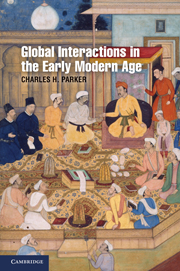Book contents
- Frontmatter
- Contents
- Maps
- Acknowledgments
- Global Interactions in the Early Modern Age, 1400–1800
- Introduction: The Global Integration of Space
- 1 European States and Overseas Empires
- 2 Asian States and Territorial Empires
- 3 International Markets and Global Exchange Networks
- 4 The Movement of Peoples and Diffusion of Cultures
- 5 The Formation of New Demographic and Ecological Structures
- 6 The Transmission of Religion and Culture
- Conclusion: Converging Destinies
- Notes
- Index
- References
2 - Asian States and Territorial Empires
Published online by Cambridge University Press: 05 June 2012
- Frontmatter
- Contents
- Maps
- Acknowledgments
- Global Interactions in the Early Modern Age, 1400–1800
- Introduction: The Global Integration of Space
- 1 European States and Overseas Empires
- 2 Asian States and Territorial Empires
- 3 International Markets and Global Exchange Networks
- 4 The Movement of Peoples and Diffusion of Cultures
- 5 The Formation of New Demographic and Ecological Structures
- 6 The Transmission of Religion and Culture
- Conclusion: Converging Destinies
- Notes
- Index
- References
Summary
Matteo Ricci, an Italian Jesuit missionary to China in the late 1500s, remarked on the highly exalted status of the Ming emperor, “The King is observed with more Rites than any other in the World. None speaks to him but his Eunuchs, and those which live in the Palace, Sons and Daughters. None of the Magistrates without the Palace…speak to the King but by Petition, and those with so many forms of veneration.” Though no Asian monarch possessed the resources of the Chinese emperor, Ricci's depiction could also have applied to the courts of the great Ottoman, Safavid, and Mughal rulers or the Russian tsar in the 1600s. While a handful of European countries were erecting governmental structures and launching overseas empires, powerful states in Asia were also consolidating their political authority and expanding enormously across the continent. Just as empire building in Europe was predicated on state power, political centralization also became major features of Asian states in the early modern period.
The power vacuum left by the faltering Mongol-Timurid Empires afforded ambitious dynasties – Ming and Qing in China, Romanov in Russia, Ottoman in Anatolia, Safavid in Iran, and Mughal in India – opportunities to acquire power over rival families and to rule their realms absolutely. Other regions that did not launch large empires also developed powerful, stable states. On the Korean peninsula, a military commander Yi Song-gye (1335–1408) ousted the ruling dynasty in 1392 and established the Choson dynasty, which lasted until the twentieth century.
- Type
- Chapter
- Information
- Global Interactions in the Early Modern Age, 1400–1800 , pp. 39 - 67Publisher: Cambridge University PressPrint publication year: 2010
References
- 1
- Cited by



